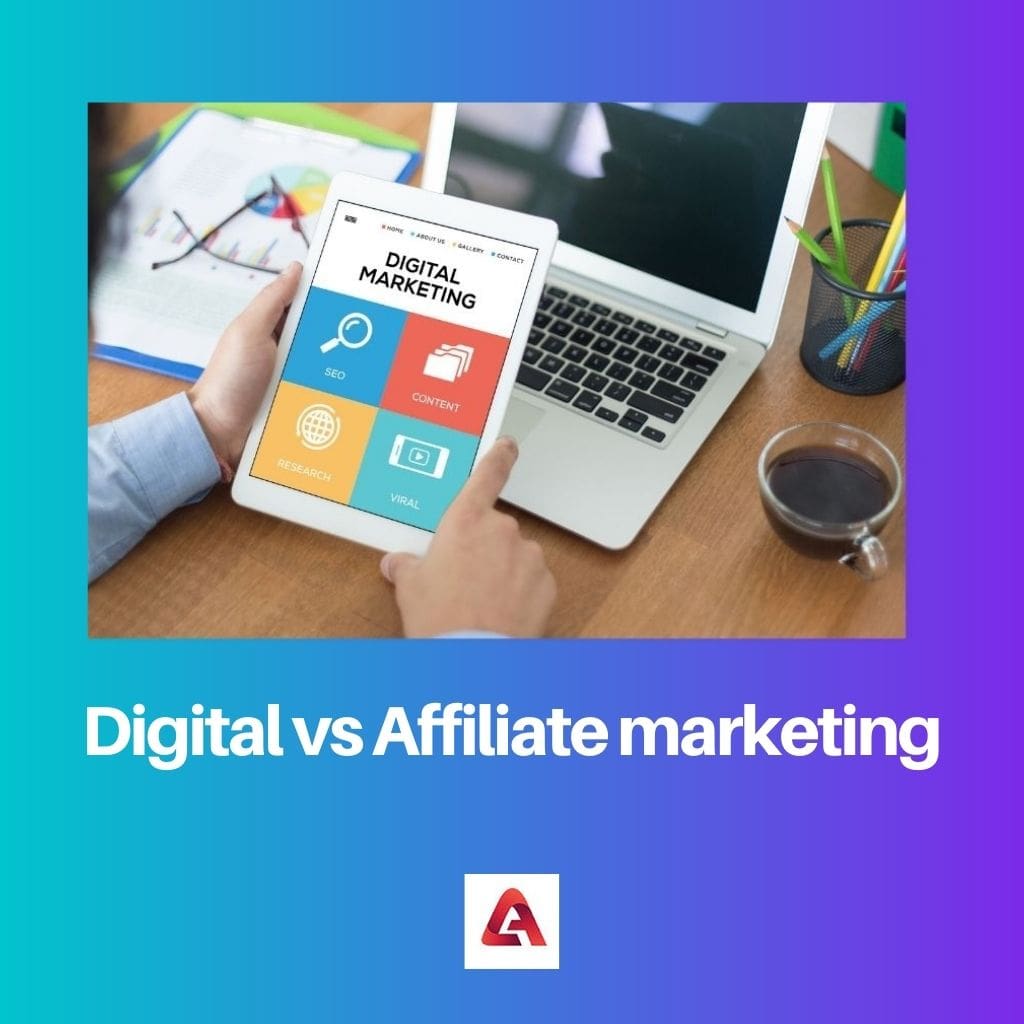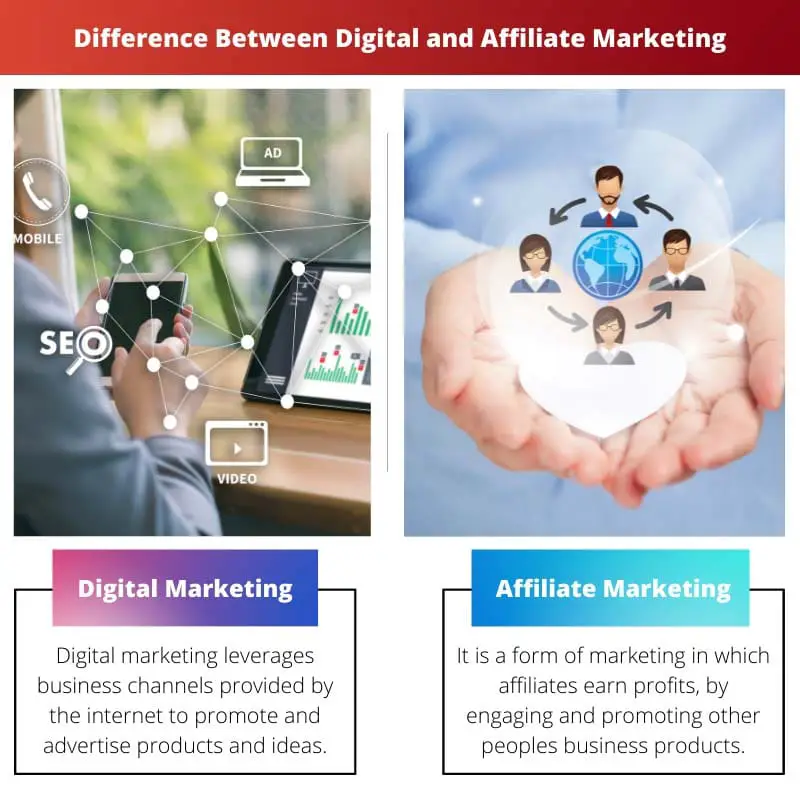Digital marketing encompasses a broad range of strategies and channels to promote products or services online, including search engine optimization (SEO), social media marketing, email marketing, content marketing, and more. Conversely, affiliate marketing is a specific subset of digital marketing where businesses incentivize affiliates to promote their products or services in exchange for a commission on sales generated through their referral efforts.
Key Takeaways
- Digital marketing encompasses all online marketing efforts, including email, social media, and content marketing; affiliate marketing is a specific strategy where individuals or businesses promote and earn commissions on third-party products or services.
- Digital marketing aims to build brand awareness, generate leads, and drive sales; affiliate marketing focuses on creating income through referral commissions.
- Affiliate marketing is a subset of digital marketing and can be integrated into a broader digital marketing strategy to diversify revenue streams.
Digital vs Affiliate Marketing
The difference between Digital and Affiliate marketing is that digital marketing involves a wide range of techniques for advertising products on various digital platforms. In contrast, affiliate marketing is a specific form of promotional service under digital marketing, where the more customers to draw, the more profit you earn.

Digital marketing involves a wide range of practices adapted to sell and advertise products on various digital platforms successfully.
Affiliate marketing is a specific form of digital marketing where the marketer gets paid based on products sold by the promotions provided by them.
Comparison Table
| Feature | Digital Marketing | Affiliate Marketing |
|---|---|---|
| Goal | Brand awareness, lead generation, sales, customer engagement | Generate sales and earn commissions for referred sales |
| Who does the marketing? | Company or its marketing team | Independent individuals or businesses (affiliates) |
| Product/Service Promoted | Company’s own products/services | Other companies’ products/services |
| Channels Used | Various online channels (website, email, social media, SEO, PPC, etc.) | Channels chosen by the affiliate (website, blog, social media, etc.) |
| Revenue Model | Sales of the company’s products/services | Commissions earned on referred sales |
| Control | Company has full control over messaging, targeting, and budget | Affiliates have some control over how they promote, but company sets guidelines |
| Reach | Potentially wider reach depending on channels and budget | Limited by the reach and influence of the chosen affiliates |
| Investment | Can be high depending on the channels and strategies used | Lower upfront investment, but success depends on affiliate’s efforts |
| Metrics Tracked | Website traffic, leads, conversions, sales, brand awareness | Clicks, conversions, sales earned through affiliate links |
What is Digital Marketing?
Introduction to Digital Marketing
Digital marketing refers to the practice of leveraging digital channels and technologies to promote products or services to a targeted audience. In today’s digitally-driven world, businesses utilize various online platforms and tools to connect with potential customers, enhance brand visibility, and drive conversions.
Components of Digital Marketing
1. Search Engine Optimization (SEO)
SEO involves optimizing a website’s content, structure, and HTML code to improve its visibility on search engine results pages (SERPs). By targeting relevant keywords and implementing SEO best practices, businesses can increase organic traffic and rank higher in search engine rankings, ultimately enhancing their online presence and attracting more potential customers.
2. Social Media Marketing
Social media marketing involves creating and sharing content on social media platforms such as Facebook, Twitter, Instagram, LinkedIn, and Pinterest to engage with target audiences and promote products or services. Through strategic content creation, community management, and paid advertising campaigns, businesses can build brand awareness, foster customer relationships, and drive website traffic and conversions.
3. Content Marketing
Content marketing focuses on creating and distributing valuable, relevant, and consistent content to attract and retain a clearly defined audience. Content can take various forms, including blog posts, articles, videos, infographics, podcasts, and more. By delivering informative and engaging content that addresses audience needs and interests, businesses can establish authority in their industry, build trust with potential customers, and drive profitable actions.
4. Email Marketing
Email marketing involves sending targeted promotional messages or newsletters to a list of subscribers who have opted in to receive communications from a business. By segmenting email lists, personalizing content, and optimizing send times, businesses can nurture leads, drive repeat purchases, and increase customer retention. Email marketing is a cost-effective and efficient way to engage with customers directly and drive measurable results.

What is Affiliate Marketing?
Introduction to Affiliate Marketing
Affiliate marketing is a performance-based marketing strategy where businesses reward affiliates for promoting their products or services and driving desired actions, such as clicks, leads, or sales. It operates on a revenue-sharing model, wherein affiliates earn a commission for each successful referral they generate through their marketing efforts.
Key Players in Affiliate Marketing
1. Merchants (Advertisers)
Merchants are businesses or brands that have products or services to sell. They create affiliate programs to incentivize affiliates to promote their offerings. Merchants provide affiliates with marketing materials, such as banners, links, and tracking codes, to facilitate the promotion and tracking of referrals.
2. Affiliates (Publishers)
Affiliates are individuals or organizations that promote merchants’ products or services through various marketing channels, such as websites, blogs, social media, email newsletters, or paid advertising. Affiliates earn a commission for each referral or sale they drive, typically through unique tracking links provided by merchants.
3. Affiliate Networks
Affiliate networks act as intermediaries between merchants and affiliates, facilitating the management of affiliate programs and tracking of referrals. They provide a platform where merchants can list their affiliate programs, and affiliates can discover and join multiple programs within the network. Additionally, affiliate networks offer tracking, reporting, and payment processing services to ensure accurate commission payouts.
Affiliate Marketing Process
1. Affiliate Promotion
Affiliates promote merchants’ products or services to their audience through various marketing channels. They may create content such as product reviews, tutorials, comparison articles, or promotional campaigns to attract potential customers and encourage them to make a purchase.
2. Tracking and Attribution
When a customer clicks on an affiliate’s unique tracking link and completes a desired action, such as making a purchase, the affiliate network or tracking software records the referral and attributes it to the respective affiliate. Tracking mechanisms ensure that affiliates receive proper credit for their marketing efforts.
3. Commission Payout
Once referrals are tracked and attributed correctly, merchants calculate commissions owed to affiliates based on predetermined commission structures, such as a percentage of sales or a fixed amount per lead. Affiliate networks or merchants then process commission payments to affiliates on a regular basis, typically monthly.

Main Differences Between Digital and Affiliate Marketing
- Scope and Approach:
- Digital marketing encompasses a wide range of strategies and channels to promote products or services online, including SEO, social media marketing, content marketing, email marketing, etc.
- Affiliate marketing, on the other hand, is a specific subset of digital marketing where businesses incentivize affiliates to promote their products or services in exchange for a commission on sales generated through their referral efforts.
- Partnership Structure:
- In digital marketing, businesses directly engage with customers through various online channels, implementing strategies to attract and retain them.
- Affiliate marketing involves partnerships between businesses (merchants) and independent marketers (affiliates), where affiliates promote the merchants’ products or services and earn a commission for successful referrals.
- Payment Model:
- Digital marketing efforts typically involve upfront costs for activities such as advertising, content creation, and campaign management.
- Affiliate marketing operates on a performance-based model, where affiliates only receive compensation when their promotional efforts result in a desired action, such as a sale or lead.

- https://shop.tarjomeplus.com/UploadFileEn/TPLUS_EN_3080.pdf
- https://nuife.org/index.php/pnap/article/download/239/220

Email marketing, with its potential to deliver personalized content and drive customer engagement, remains a powerful tool in the digital marketing arsenal.
Well said, Llewis. Effective email marketing allows businesses to nurture leads and maintain meaningful connections with their audience through tailored messaging.
The variety of digital marketing tools and channels available today provides businesses with numerous options to reach and engage their target audience effectively.
You’re right, Bharris. Businesses must utilize the diverse digital marketing tools strategically to maximize their online visibility and customer reach.
The role of affiliate marketers in promoting third-party products and earning commissions highlights the collaborative nature of affiliate marketing within the digital marketing ecosystem.
Indeed, Saunders Stefan. Affiliate marketing fosters mutually beneficial relationships between marketers and product owners, driving shared success.
But skeptics argue that affiliate marketing can lead to biased promotions and recommendations, as marketers may prioritize products with higher commissions rather than genuine quality and value.
Affiliate marketing’s emphasis on building customer relationships to drive sales is a key aspect. It’s a form of marketing that values personal connections and trust.
But sometimes, affiliate marketing can also be seen as exploiting personal relationships for financial gain, which may not always sit well with consumers.
I couldn’t agree more, Poppy20. Establishing trust and rapport with potential customers is fundamental in the success of affiliate marketing.
The comparison between digital marketing and affiliate marketing is insightful. Both encompass different strategies and tactics to achieve marketing objectives.
Absolutely, Stewart Leanne. Understanding the nuances of each marketing approach is crucial for businesses to make informed decisions about their promotional activities.
The concept of affiliate marketing within the broader digital marketing strategy is fascinating. It allows businesses to diversify their revenue streams while leveraging the power of referrals.
Absolutely, Young Bethany. Affiliate marketing enables businesses to reach wider audiences and gain valuable leads through partnerships.
Digital marketing’s emphasis on utilizing digital channels and techniques for brand promotion and visibility is paramount in today’s competitive market.
However, the reliance on digital marketing alone may overshadow the importance of offline marketing and traditional advertising methods in certain industries.
Absolutely, Stephen Kelly. Businesses need to adapt and leverage digital marketing methods to stay relevant and competitive in the digital landscape.
I’ve always found digital marketing to be quite comprehensive and multi-faceted, with various components working together to achieve business goals.
Indeed, Eleanor42. Digital marketing requires a deep understanding of different platforms and techniques to effectively promote products and services.
I beg to differ. Digital marketing can sometimes be overwhelming and complex, especially for businesses new to the online landscape.
Digital marketing is an essential tool in today’s business landscape, with the growth of online business. Understanding the difference between digital and affiliate marketing is crucial for businesses to create effective marketing strategies.
I completely agree, Xcook. Digital marketing is ever-evolving, and it’s important for businesses to stay updated with the latest trends to maximize their marketing efforts.
The integration of SEO, content marketing, and social media strategies under digital marketing reflects the depth and complexity of modern online promotional activities.
Absolutely, Toby Cooper. The synergy between various digital marketing components is crucial in shaping a comprehensive and effective marketing approach.